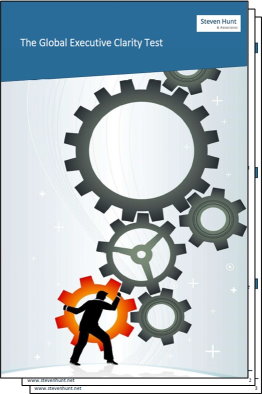The path to the top is uneven. Look back on your career and I’ll bet the path you took isn’t exactly what you planned.
Chances to progress come when we least expect them.
You get promoted and then… the mythical “first 100 days” in a position of power. Lots has been written about it. Little fits with what I’ve seen first-hand, nor what executives say to me off the record in my mentoring circles – where they open up and share what’s really on their mind.
The first 100 days will look like the last 100 days. You don’t change winning habits overnight. You tend to stick with the habits that got you promoted, not abandon them.
However, there are three characteristics that help people get off to a flying start in a new global role.
#1 Accept the higher position, its status, its prestige and – crucially – its power
Being thrown into the #1 role at a country, regional or global level is a special challenge. The status and prestige of the higher position can be seductive. Suddenly, you’re the senior executive of this or the Senior VP or that. And people wait to hear your voice, your decision.
There are three big challenges. You’ve got more people under you but less time for each individual. Those people are harder to reach because they are in a different time zone. Or they are harder to connect with because they are in another global location that you only visit once a quarter.
The symptoms of accepting the power that comes with the global position are:
- You push people to meet key deadlines, and it’s clear who’s accountable for which outcomes and consequences.
- You don’t pull people into meetings that they don’t need to be in. You run teams not committees.
- You push people to take the tough decisions, not delay them until your next visit or until they have all the data. That day will never come.
- You manage conflict, and don’t avoid it. Friction and competing ideas are a rich source of innovation.
The long-term consequences are that it adds to clarity, multiplies the trust and cuts out game-playing and manipulation.
#2 Be consciously vulnerable
It’s always been lonely at the top. Nobody has the skill or the will (or both) to lead alone. We all need to be open with others. Being vulnerable means taking the risk to be open.
Wise leaders are not vulnerable to everyone all the time. You just consciously choose your advisers and what you want to be open about. We’re the average of the half dozen people we spend the most time with. So it pays to be discerning.
- The symptoms of being healthily vulnerable in a senior global position are:
- You have a robust support system – with at least one expert in each country and local market who knows it well.
- You’re happy to get out of your bubble and hear opinions that contrast with yours.
- You open up to employees and other stakeholders step-by-step. There’s a healthy balance between not telling the truth and fully exposing everything you know, hope for, and fear. That’s the balance between honesty and confidentiality.
- You show gratitude to others when they are open.
Healthy vulnerability isn’t a weakness. It’s a major strength. It leads to a positive spiral of trust. And trust is a core element in a culture of innovation, clear feedback, and giving customers what they want. Trust is also vital for global operations because it’s what people do when you’re not there that sets the cultural pattern at work.
#3 Gravitas and strong self-confidence
Strong self-confidence means avoiding the imposter syndrome (i.e. feeling out of place, underqualified, inexperienced, or fake – which makes for unclear decisions and ignoring your intuition, slowing everything down.)
Confident executives rise to the top because their skills and personality which they’ve worked hard to improve over the years. That personal combination is a pattern of behaviour, and it is repeatable for more success.
The symptoms of self-confidence in a senior global position are:
- The volume on the “internal dialog of doubt” in your head is so low that 99% of the time it is inaudible.
- You use tools to repeat and amplify your success, like meditation, morning mantras or a Success Journal.
- You consciously write down the praise you get from others and review it once a month to discover the positive, repeatable behaviours.
- You engage in identifying and refining your Personal Success Factors.
Confidence grows when you raise awareness of the positive behaviours that lead to your successes. Take the time to analyse what made you win, how you created success. When you can identify those success factors, the probability of repeating them is exponentially higher.
A forgettable first 100 days is producing a grand vision and making multiple, radical changes to your behaviour.
A fantastic first 100 days looks more like this: accepting power, being healthily vulnerable and strengthening your self-confidence. This is what executives say, in private, is the best way start to being higher up the ladder.
















